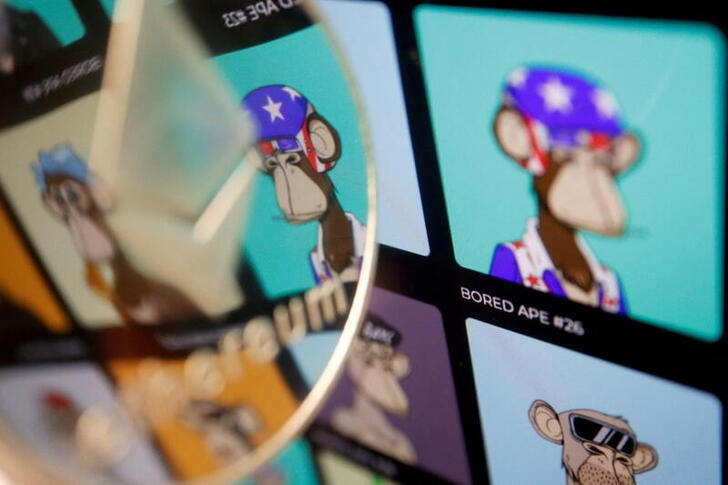US appeals court weighs NFT ‘counterfeiting’ in Bored Ape case

A representation of cryptocurrency Ethereum is seen next to non-fungible tokens (NFTs) of Yuga Labs “Bored Ape Yacht Club” collection displayed on its website, in this illustration picture taken March 24, 2022. REUTERS/Florence Lo/Illustration Acquire Licensing Rights
Oct 16 (Reuters) – A U.S. appeals court on Monday struggled with where to draw the line between art and counterfeiting in a trademark lawsuit against conceptual artist Ryder Ripps over his copies of Yuga Labs’ popular Bored Ape Yacht Club non-fungible tokens.
Ripps’ attorney urged a skeptical panel of judges on the 9th U.S. Circuit Court of Appeals to rule that Yuga’s case against him should have been thrown out under California’s anti-SLAPP statute, which protects conduct “in furtherance of” free speech from frivolous lawsuits.
Yuga’s lawsuit accuses Ripps of making millions of dollars from counterfeiting its Bored Ape tokens under the pretense of satire. Ripps has defended his copies as works of appropriation art that criticize supposedly racist and anti-Semitic imagery in Yuga’s NFTs and branding.
U.S. District Judge John Walter ruled for Yuga at a later stage of the case in April, finding that Ripps’ NFTs were “no more artistic than the sale of a counterfeit handbag.”
Ripps’ attorney Thomas Sprankling told the appeals court on Monday that the NFTs were “expressive both in and of themselves” and as “part of a broader artistic project” for Ripps, a vocal critic of Yuga.
Sprankling also cited PETA Chicken McNuggets, which “would have a very different meaning because PETA is critical of factory farming,” and a Greenpeace-branded SeaWorld as examples of similar conduct that he said would be protected by the California statute.
“Those seem to be on the other side of whatever line we’re trying to get at” than selling a “virtually indistinguishable NFT through the same marketplace,” U.S. Circuit Judge Anthony Johnstone said.
Johnstone also questioned whether “punching Yuga Labs’ founders in the face on a TikTok video” would be protected based on Ripps’ argument.
Circuit Judge Morgan Christen also said that she was “looking for a limiting principle,” and Circuit Judge Carlos Bea questioned whether Ripps’ works communicated any criticism.
Johnstone also told Yuga’s attorney Todd Gregorian of Fenwick & West that some of the company’s allegations against Ripps, like those based on his alterations to a company logo that he accused of resembling a Nazi symbol, “seem to be a little troubling on the anti-SLAPP side.”
The case is Yuga Labs Inc v. Ripps, 9th U.S. Circuit Court of Appeals, No. 22-56199.
For Yuga: Todd Gregorian of Fenwick & West
For Ripps: Thomas Sprankling of Wilmer Cutler Pickering Hale and Dorr
Read more:
US judge sides with Yuga Labs in Bored Ape NFT trademark lawsuit
Artist fires back at Bored Ape lawsuit with racism accusations
Bored Ape NFT maker Yuga Labs sues artist, claiming he copied tokens
Reporting by Blake Brittain in Washington
Our Standards: The Thomson Reuters Trust Principles.